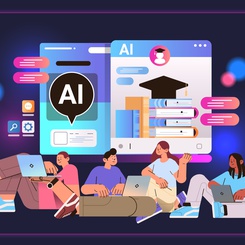With Jeroen Rombouts
On February 6th, 2023, Google announced the deployment of BARD, a rival model to ChatGPT, in response to the collaboration between OpenAI and Microsoft to integrate GPT-4 into Bing. This competition between the tech giants in the AI space is fuelling an innovation race to redefine web search, seeking to provide a more natural and intuitive experience for users.
Such commercial rivalries are but a glimpse into the myriad ways AI is poised to reshape our world. Therefore, it is crucial to delve deeper and critically assess the profound impact that Artificial Intelligence is set to have on both our professional and personal spheres. This involves understanding the mechanics of AI-powered technologies and the vast expanse of their potential applications. With Machine Learning methods being woven more deeply into strategic decision-making and value creation processes across organizations, we must gauge their economic, ethical, social, ecological, and political repercussions. Consequently, it's imperative for future managers to acquire proficiency in these tools.
Thomas Huber and Jeroen Rombouts, professors in the Information Systems, Decision Sciences and Statistics Department, explored ESSEC students’ perceptions of AI. Over 1000 students in a course on Introduction to AI for Business answered a survey looking at their attitudes towards AI, including its potential and its risks.
Do they perceive AI as a threat, or rather as a solution to current challenges and crises? A mix of both: they tend to think that AI can address society’s grand challenges, but that it bears risks.
AI: a response to contemporary challenges.
Artificial intelligence is advancing at a rapid pace, finding applications in an expanding range of domains and consequently reshaping the landscape of value creation. For example, the progress made in fields, such as language processing for translation or text summarization, underscores this transformative impact. ESSEC students are optimistic about these future impacts. The average response to the question "On a scale from 1 (low) to 20 (high): how do you see the benefits related to AI?" is 16/20, highlighting the enthusiasm students have for AI.
This enthusiasm for the future of AI-powered solutions is also underscored by a sentiment analysis. With many students displaying anticipation, optimism, and joy, it seems that artificial intelligence is primarily perceived as a tool whose multiple use cases can positively impact our way of living and consuming.
ESSEC students envision a myriad of managerial and business applications for emerging AI technologies. Some of the standout themes from their responses encompass:
· AI-driven automation of tasks and support in managerial decision-making.
· Broader adoption of text and face recognition technologies.
· Personal AI assistants powered by artificial intelligence
· Recommendation algorithms on social networks and e-commerce platforms.
ESSEC students believe that such AI-powered technologies hold the potential to create significant value, especially in the health sector, with 40% pinpointing this as AI's paramount application. Furthermore, they recognize AI's potential role in combating climate change, evident from an average score of 14/20 when asked about its significance in this arena. Finally, students anticipate innovative AI tools to become integral to their academic experience. On the one hand, they anticipate that AI will be used to improve pedagogy in business schools, e.g., by supporting adaptive learning approaches. On the other, they express a desire to understand the business implications of AI through multidisciplinary approaches and tangible use cases.
Inherent risks to the development of AI
Although AI-powered technologies could address some of our contemporary problems, ESSEC students identify several risks inherent to their development. These concern ethics, decision-making, and the impact of artificial intelligence on work, which directly impacts our personal and professional lives. Students are concerned about job loss, particularly when it comes to biases in data collection and processing, and about the loss of control we experience by replacing human decision-making by AI tools.
The other central strand of discussion about AI's dangers is data security and privacy breach, with 25% of students believing this is the most severe threat posed by AI. These concerns are not unfounded.
Students therefore see a need to take back control over AI technologies and for greater transparency of AI applications. To address this, one proposed strategy involves pinpointing specific use cases that entail privacy infringements, thus paving the way for tailored legislative measures proportionate to the associated risk. Finally, the students were also asked about the obstacles to developing these technologies. Some of these barriers are technical challenges, such as acquiring quality data or increasing the computing power needed to run AI-powered technologies. Others are related to users and institutional perceptions of these innovations. About half of the students believe that the main barrier to the development of AI is individuals' fear of losing control of these new technologies and their general lack of confidence in these innovations. While many view regulation as a safeguard to prevent AI from spiralling out of control, students also express concerns that such regulation could, in itself, pose an obstacle to AI's potential. Therefore, the major challenge facing AI regulators will probably lie in their ability to react quickly to the emergence of new technologies while avoiding slowing down research that could reveal very promising uses in fields such as health and climate change, and in other untapped areas.
Conclusion
On the whole, ESSEC students are optimistic that AI can be a solution to contemporary challenges. They recognize the potential benefits of AI, particularly in the areas of healthcare and climate change. However, they also acknowledge the associated risks, such as the substitution of human decision-making, biases in data processing, and concerns regarding data security and privacy breaches. The students' point of view on AI for business applications encompass a wide range, including automation and enhanced recommendation algorithms. To prepare for the AI-driven future, education must adapt by incorporating AI knowledge and skills through a multidisciplinary approach and practical use cases. By embracing AI responsibly, businesses and individuals can navigate the complex AI landscape and contribute to positive societal impact.









